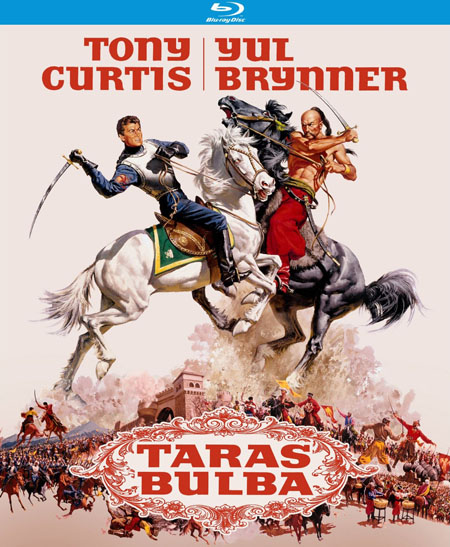
BY LEE PFEIFFER
At the time of its release in 1962 critics treated director J. Lee Thompson's "Taras Bulba" as just another action epic. Well, back in those days, every week seemed to see the release of a worthwhile action epic. However, retro movie fans have long held this film in a place of honor. It has an intelligent script, fine performances and sequences that are truly magnificent in their scope- all set to the legendary Franz Waxman's superb, Oscar-nominated score. The film is unusual on many levels beginning with the period of history it covers: the battles between the Cossacks and Poles for control of the Ukraine Steppes in the early 16th century. When the film opens, the Cossacks are fighting with the Poles to thwart an invading Turkish army. However, the Poles double-cross their allies after victory has been achieved, slaughtering many of the Cossacks, whom they fear will be a future threat. The mantle of Cossack leadership falls to the courageous warrior Taras Bulba, who vows revenge against Poland no matter how long it takes. The Cossacks spend many years rebuilding their strength. During this time, Bulba fathers two sons: Andrei (Tony Curtis) and Ostap (Perry Lopez), both of whom do instill him with pride for adapting the rough-and-tumble ways of the Cossack warriors. When tensions ease with the Polish government, Taras instructs his sons to attend university in Kiev, ostensibly to get an education. In reality, he wants them to study Polish customs and habits, all the better to serve in the forthcoming war against them that he is planning. While in Kiev, the boys suffer the indignities of ridicule, beatings and hazings. (There is an amusing, if unintended,homo erotic aspect to some of these scenes, with sweaty, shirtless men whipping each other.) Andrei finds it's all worthwhile when he catches a glimpse of Natalia Dubrov (Christine Kaufmann), a beautiful young Polish girl who is from an influential family. Against all odds, he manages to catch her eye and ingratiate himself to her. The would-be lovers find ways to secretly meet to carry out their forbidden romance. (The notion of a Polish noblewoman carrying on a love affair with a crude Cossack warrior may seem far-fetched, but if the Cossack is Tony Curtis, I guess anything is possible.) When Andrei's interest in Natalia is discovered by her brother, a sword fight ensues in which Ostap mortally wounds the Polish army officer. The brothers escape back to the Steppes and the arms of their mother and father but Andrei still pines away for his lost love. Taras rallies the various Cossack tribes to join him in an assault on a city held by Poles. After a vicious battle, he bottles up his enemies inside the walls of the town and begins to starve them out. However, Andrei learns that Natalia is within the city and when plague breaks out, he makes an ill-fated decision to attempt to rescue her. This leads to the film's dramatic and very emotional climactic seen between Taras and Andrei.
"Taras Bulba" has been released on Blu-ray by Kino Lorber Studio Classics. The transfer is outstanding and is so clear that some of the film's technical weaknesses appear more prominent than they probably did on the big screen. The scenes within Kiev are clearly achieved through the use of studio sets and matte paintings. Some scenes have a noticeable graininess to them and in certain cavalry charges, you might observe horsemen moving at sped up motion in the manner of the Keystone Cops. Nevertheless, this is an epic film indeed when it comes to the action sequences. One scene in particular is literally thrilling: the joining of the Cossack warriors on the open plain, all galloping at high speed to Franz Waxman's addictive musical score. The performances are also first-rate with Brynner giving a larger-than-life interpretation of Bulba in manner that no other actor of this era could achieve. Tony Curtis once again overcomes a New York accent (as he did in "The Vikings") and somehow appears completely credible. (An interesting footnote: Bulba's right hand man Shilo is played by Brynner's "Magnificent Seven" co-star Brad Dexter.) Christine Kaufmann was only 16 years old at the time of filming and the on-screen love affair with Tony Curtis replicated itself in real life: they began dating on the set and ended up getting married, though they divorced in 1968.
The Blu-ray disc includes an original trailer that absurdly proclaims, in the typical hyperbole of the day, that the film should be added to the list of "Wonders of the World"! Not quite. But say this for "Taras Bulba": it represents the kind of first rate action adventure epic of which it is often said "They sure as hell don't make 'em like that anymore."
CLICK HERE TO ORDER FROM AMAZON